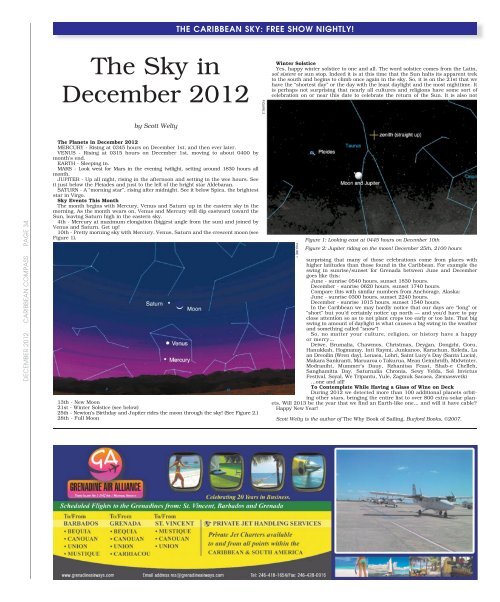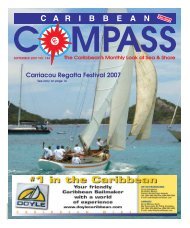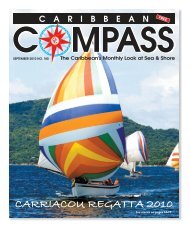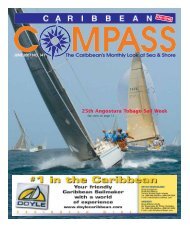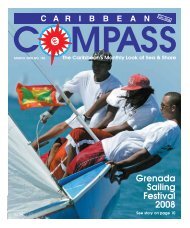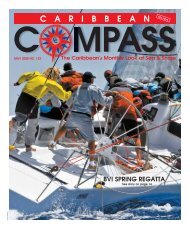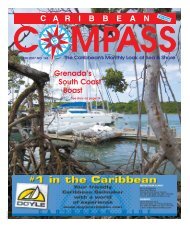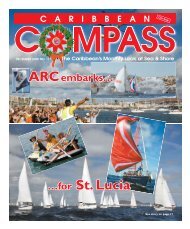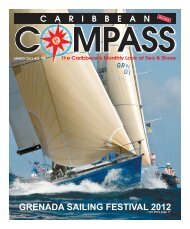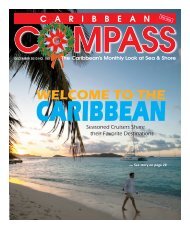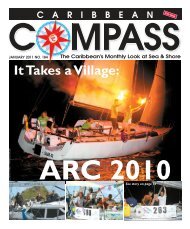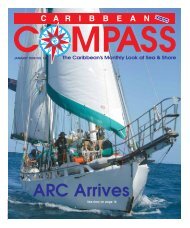Subscribers - Click here - Caribbean Compass
Subscribers - Click here - Caribbean Compass
Subscribers - Click here - Caribbean Compass
You also want an ePaper? Increase the reach of your titles
YUMPU automatically turns print PDFs into web optimized ePapers that Google loves.
DECEMBER 2012 CARIBBEAN COMPASS PAGE 34<br />
The Sky in<br />
December 2012<br />
by Scott Welty<br />
The Planets in December 2012<br />
MERCURY - Rising at 0345 hours on December 1st, and then ever later.<br />
VENUS - Rising at 0315 hours on December 1st, moving to about 0400 by<br />
month’s end.<br />
EARTH - Sleeping in.<br />
MARS - Look west for Mars in the evening twilight, setting around 1830 hours all<br />
month.<br />
JUPITER - Up all night, rising in the afternoon and setting in the wee hours. See<br />
it just below the Pleiades and just to the left of the bright star Aldebaran.<br />
SATURN - A “morning star”, rising after midnight. See it below Spica, the brightest<br />
star in Virgo.<br />
Sky Events This Month<br />
The month begins with Mercury, Venus and Saturn up in the eastern sky in the<br />
morning. As the month wears on, Venus and Mercury will dip eastward toward the<br />
Sun, leaving Saturn high in the eastern sky.<br />
4th - Mercury at maximum elongation (biggest angle from the sun) and joined by<br />
Venus and Saturn. Get up!<br />
10th - Pretty morning sky with Mercury, Venus, Saturn and the crescent moon (see<br />
Figure 1).<br />
13th - New Moon<br />
21st - Winter Solstice (see below)<br />
25th - Newton’s Birthday and Jupiter rides the moon through the sky! (See Figure 2.)<br />
28th - Full Moon<br />
THE CARIBBEAN SKY: FREE SHOW NIGHTLY!<br />
FIGURE 2<br />
Winter Solstice<br />
Yes, happy winter solstice to one and all. The word solstice comes from the Latin,<br />
sol sistere or sun stop. Indeed it is at this time that the Sun halts its apparent trek<br />
to the south and begins to climb once again in the sky. So, it is on the 21st that we<br />
have the “shortest day” or the day with the least daylight and the most nighttime. It<br />
is perhaps not surprising that nearly all cultures and religions have some sort of<br />
celebration on or near this date to celebrate the return of the Sun. It is also not<br />
FIGURE 1<br />
Figure 1: Looking east at 0445 hours on December 10th<br />
Figure 2: Jupiter riding on the moon! December 25th, 2100 hours<br />
surprising that many of those celebrations come from places with<br />
higher latitudes than those found in the <strong>Caribbean</strong>. For example the<br />
swing in sunrise/sunset for Grenada between June and December<br />
goes like this:<br />
June - sunrise 0540 hours, sunset 1830 hours.<br />
December - sunrise 0620 hours, sunset 1740 hours.<br />
Compare this with similar numbers from Anchorage, Alaska:<br />
June - sunrise 0300 hours, sunset 2240 hours.<br />
December - sunrise 1015 hours, sunset 1540 hours.<br />
In the <strong>Caribbean</strong> we may hardly notice that our days are “long” or<br />
“short” but you’d certainly notice up north — and you’d have to pay<br />
close attention so as to not plant crops too early or too late. That big<br />
swing in amount of daylight is what causes a big swing in the weather<br />
and something called “snow”!<br />
So, no matter your culture, religion, or history have a happy<br />
or merry…<br />
Deiwe, Brumalia, Chawmos, Christmas, Deygan, Dongzhi, Goru,<br />
Hanukkah, Hogmanay, Inti Raymi, Junkanoo, Karachun, Koleda, La<br />
an Dreoilin (Wren day), Lenaea, Lohri, Saint Lucy’s Day (Santa Lucia),<br />
Makara Sankranti, Maruaroa o Takurua, Mean Geimhridh, Midwinter,<br />
Modraniht, Mummer’s Dauy, Rzhanitsa Feast, Shab-e Chelleh,<br />
Sanghamitta Day, Saturnalia Chronia, Sewy Yelda, Sol Invictus<br />
Festival, Soyal, We Tripantu, Yule, Zagmuk Sacaea, Ziemassvetki<br />
…one and all!<br />
To Contemplate While Having a Glass of Wine on Deck<br />
During 2012 we detected more than 100 additional planets orbiting<br />
other stars, bringing the entire list to over 800 extra-solar planets.<br />
Will 2013 be the year that we find an Earth-like one… and will it have cable?<br />
Happy New Year!<br />
Scott Welty is the author of The Why Book of Sailing, Burford Books, ©2007.


